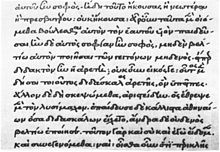Leonardo Bruni
Leonardo Bruni (* approx. 1369 in Arezzo ; † March 9, 1444 in Florence ), also called Aretino after his hometown , was an Italian humanist and State Chancellor of Florence.
Life
Leonardo Bruni came from a poor family and came to Florence as a student. Here he was a student of the Greek scholar Manuel Chrysoloras and was accepted into the circle of the humanist Coluccio Salutati . Due to his early mastery of the Greek language in particular , he advocated the revival of the ancient literary traditions and thus became one of the main representatives of Renaissance literature . In 1405 he received the post of papal secretary and served in this capacity under the Popes Innocent VII , Gregory XII. , Alexander V. and Johannes XXIII. , whom he accompanied to the council in Constance . Returning to Florence, he devoted himself above all to his literary work, especially the depiction of Florentine history. From 1427 he succeeded Coluccio Salutati as State Secretary of the Republic of Florence, where he died in 1444. His tomb, made in marble by Bernardo Rossellino , is in the Church of Santa Croce .
Works

Bruni was the first to create a large number of translations of Plato : Phaedo in 1404/05, Gorgias in 1409, Crito in 1423/27, the Apology from 1424, Phaedrus in 1424, the Letters in 1427. He also translated Plutarch , Demosthenes and Aeschines . He achieved great fame as a translator of the Nicomachean ethics and the economic and political writings of Aristotle . He rewrote Xenophon's Hellenika under the title Commentarius rerum grecarum . In 1410 he wrote a history of Florence under the title Historia del popolo fiorentino (printed in Latin translation in 1650 as Historiarum Fiorentinarum libri XII ). In addition, he compiled biographies of Dante Alighieri and Francesco Petrarca in Italian under the title Vite parallele di Dante e Petrarca . The comedies in Italian, Calphurnia et Gurgulia and Commedia poliscene , ascribed to him , were evidently written by another Leonardo of Arezzo , probably a monk in de la Sorte.
In his dialogue Ad Petrum Paulum Histrum , Bruni advocated the literary use of a purely Florentine vernacular and was thus a forerunner of the Italian language question of the 16th century. His treatise De studiis et litteris , a kind of guide to academic studies, emphasizes the inseparability of subject knowledge and language culture or literary quality. Bruni explicitly includes women in his educational program, but differentiates between men and women when it comes to the question of the objects of knowledge worth knowing.
Editions and translations
- Leonardo Bruni: Dialogi ad Petrum Paulum Histrum , ed. by Stefano Ugo Baldassari, Olschki, Florenz 1994 (with detailed introduction pp. 1–232 and bibliography pp. 283–290).
- Leonardo Bruni: Historiae Florentini populi / History of the Florentine People , ed. by James Hankins. 3 volumes. Harvard University Press, Cambridge (Mass.) 2001–2007 (Latin text and English translation)
- Leonardo Bruni: Humanist-Philosophical Writings , ed. by Hans Baron , Leipzig / Berlin 1928
- Leonardo Bruni: Laudation Florentine urbis , ed. by Stefano Ugo Baldassarri, Società Internazionale per lo Studio del Medioevo Latino, Florence 2000, ISBN 88-87027-98-6 (critical edition)
- Leonardo Bruni: The Study of Literature. In: Craig W. Kallendorf (Ed.): Humanist Educational Treatises. Harvard University Press, Cambridge (Massachusetts) 2002, ISBN 0-674-00759-X , pp. 92–125 (Latin text from De studiis et litteris and English translation)
- Susanne Daub (Ed.): Leonardo Bruni's speech on Nanni Strozzi. Teubner, Stuttgart / Leipzig 1996, ISBN 3-519-07633-0 (critical edition with detailed text analysis and explanations)
literature
- Gerl, Hanna-Barbara: Philosophy and Philology. Leonardo Bruni's transfer of the Nicomachean ethics in its philosophical premises , Munich 1981. ISBN 3-7705-1967-1 .
- Hankins, James: Repertorium Brunianum: a critical guide to the writings of Leonardo Bruni, Roma: Istituto Storico Italiano per il Medio Evo 1997
- C. Vasoli: Bruni (Brunus, Bruno), Leonardo (Lionardo), detto Leonardo Aretino. In: Alberto M. Ghisalberti (Ed.): Dizionario Biografico degli Italiani (DBI). Volume 14: Branchi-Buffetti. Istituto della Enciclopedia Italiana, Rome 1972.
- Gary Ianziti: Writing History in Renaissance Italy: Leonardo Bruni and the Uses of the Past. Harvard University Press, 2012. ISBN 978-0-674-06152-1 .
- Hans Baron : The crisis of the early Italian Renaissance - Civic Humanism and republican liberty in the Age of classicism and tyranny , Princeton 1955.
- Hans Baron: Citizenship and Humanism in the Florence of the Renaissance , Berlin 1992. ISBN 3803151384 .
- Andreas Kamp: From the Paleolithic to the Postmodern - The Genesis of our Epoch System , Vol. I: From the Beginnings to the End of the 17th Century , Amsterdam / Philadelphia 2010, pp. 71–76 (on Bruni's conception of history)
Web links
- Literature by and about Leonardo Bruni in the catalog of the German National Library
- Works by Leonardus Brunus Aretinus in the complete catalog of incandescent prints
- http://www.newadvent.org/cathen/03011b.htm
- http://dash.harvard.edu/bitstream/handle/1/2958221/BruniHistoryHJ.pdf?sequence=4
- Autograph by Leonardo Bruni: composite manuscript. Italy 1440 in the digital offer of the Biblioteca Apostolica Vaticana (Pal. Lat. 1598)
- An vulgus et literati eodem modo per Terentii Tullique tempora Romae locuti sint
- De Bello Italico Adversus Gothos
- De studijs et litteris ad illustrem dominum baptistam de malatesta tractatulus. Leipzig 1496.
- Epistola ad Baptistam de Malatestis.
- Time signal : 03/09/1444 - Death of Leonardo Bruni
Individual evidence
- ↑ Kurt Flasch : The philosophical thinking in the Middle Ages , 2nd, revised and expanded edition, Reclam, Stuttgart 2000, p. 583f.
| personal data | |
|---|---|
| SURNAME | Bruni, Leonardo |
| ALTERNATIVE NAMES | Aretino |
| BRIEF DESCRIPTION | Italian humanist and State Chancellor of Florence |
| DATE OF BIRTH | around 1369 |
| PLACE OF BIRTH | Arezzo |
| DATE OF DEATH | March 9, 1444 |
| Place of death | Florence |

